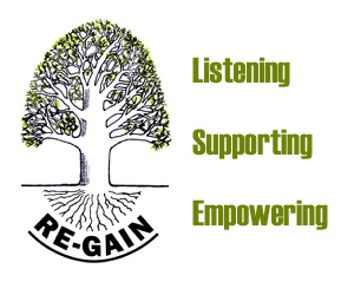Compliments and Complaints Policy
Reviewed September 2022
This is a general policy for Re-Gain. Due to the diverse nature of mental health work, projects may be required to have their own procedures which are more specific to the particular service but are guided by the principles below.
A complaint is an expression of dissatisfaction, however made, about the standards of service, behaviour of staff, policies of Re-Gain, actions or lack of action by staff or members affecting an individual or group. Complaints may arise from individuals or organisations. Whatever their origin, the procedure for dealing with them remains the same.
Complaints which are made in written form are easily identifiable; others may not be. Some people may be reticent, apprehensive or apologetic about complaining. This does not reduce the relevance of the complaint, nor alter the way in which it should be treated. It is our job to see that the complaint is recognised, given due weight, remedied and that the client is satisfied with the outcome.
Any remark which reflects dissatisfaction with our service should be registered even though not strictly being defined as a complaint. Remarks such as, your letter never arrived, or that information wasn't much good, or I'd given up waiting for a reply, or I gave up trying to get hold of you, should all be recorded with whatever additional information can be gleaned. This is the only way we can be certain that we are doing our best.
Compliments are to be recorded on the projects service user survey forms and discussed at staff meetings. Complaints are recorded in the Projects' Complaint Register.The procedure
The complaints procedure is designed to address the needs of the complainant rather than Re-Gain. Our response should be simple to understand and be seen to be fair and effective. In most circumstances complaints can be dealt with effectively by administration staff. An explanation as to why the problem has occurred, an apology and reassurance that you are dealing with the problem is often enough. If the complaint is resolved at this stage it need only be recorded. In some cases the complaint may be more complex. In these circumstances the following procedure should be followed.
Verbal complaints
For verbal complaints, action taken should be as follows: The person who had the initial dealings with the complainant should be given the opportunity in the first instance, to resolve the issue. If the complaint is received by someone other than the originator, the complainant should be transferred immediately to the member of staff concerned. If she/he is not available, the complainant should be asked for information only and must be told that the complaint will be dealt with as a matter or urgency.
No views should be expressed under any circumstances; this must be left to the member of staff who will be dealing with the complaint. The member of staff dealing with the complaint must respond to the complainant within 24 hours, but immediately if possible. If this is not possible, the member of staff must brief one of the Director's, or a senior staff member in their absence. The responsibility for dealing with it will then rest with him/her. The 24-hour rule would still apply.
Written complaints
For written complaints, action taken should be as follows: A letter acknowledging the complaint must be sent to the complainant within two working days. At this stage an investigation may be required into the nature of the complaint. The object is to establish the facts of the case.
A letter detailing the investigation and subsequent findings should now be sent to the complainant by the Manager (with a copy to a Director). This should be within ten working days of the receipt of the complaint.
If the matter is particularly complex and further time is required, a further letter should be sent explaining the reasons why and including details of when a response will be sent. Complainants do not want detailed responses justifying why the situation arose. Generally they need to know that their complaint has been taken seriously, an apology is given and what steps are being taken to prevent the situation happening to anyone else. The letter should also advise the complainant that if they are not happy with the result they can ask for a review to be conducted. The name and address of the person responsible for conducting the review should be provided.
If the complaint is resolved at this stage it should be recorded in the complaints file as such (held with the project's Director or Manager). If the complaint is not resolved, a review will be undertaken by the Steering Group Chairman. The review will deal only with the following matters:-
1 That the investigation has been conducted according to the procedure above;
2 That the investigation has been fairly handled.
